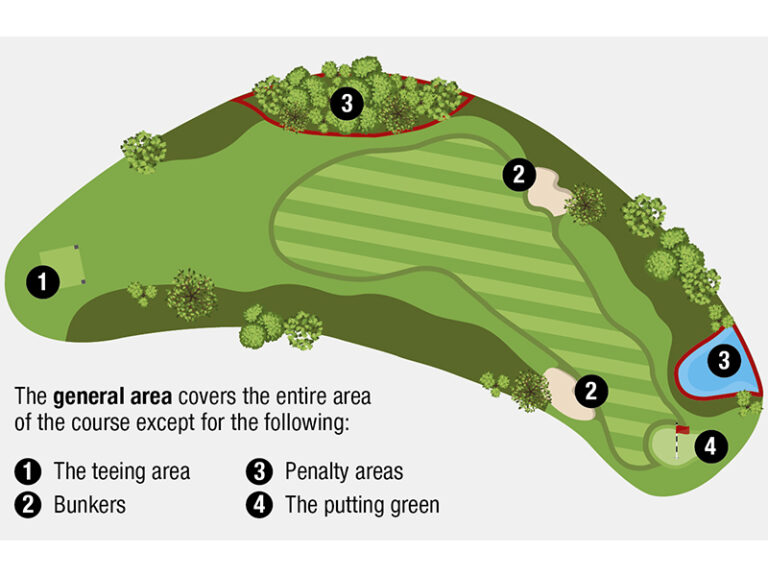Good golf scores vary by skill level. For beginners, scoring under 100 is good; for professionals, par or better is excellent.
Golf is a sport of precision and skill. Scoring well can be challenging but rewarding. Beginners often aim to break 100, while intermediate players target scores in the 80s and 90s. Advanced golfers strive to achieve par or better, which is typically 72 for an 18-hole course.
Factors such as course difficulty and weather conditions can affect scores. Consistent practice and understanding the fundamentals are key to improving. Knowing what constitutes a good score for your level helps set realistic goals. Whether you’re a novice or an expert, tracking your progress can enhance your enjoyment and performance in the game.
Contents
Factors Influencing Golf Scores
Understanding what constitutes a good golf score can be complex. Several factors influence a player’s performance on the course. These factors can vary greatly from one game to another. Let’s delve into the key elements that impact golf scores.
Skill Level
A golfer’s skill level is a significant determinant of their score. Beginners often score higher as they are still mastering the basics. Intermediate players tend to score lower as they improve their technique and strategy. Professional golfers usually achieve the lowest scores due to their extensive training and experience.
- Beginners: Typically score over 100
- Intermediate: Score between 80-100
- Professionals: Often score below 70
Course Difficulty
Not all golf courses are created equal. Course difficulty can significantly impact a player’s score. Easier courses have fewer hazards and shorter distances between holes. Challenging courses feature more obstacles, longer distances, and complex terrains.
| Course Type | Difficulty Level | Average Score |
|---|---|---|
| Beginner Course | Easy | 90-110 |
| Amateur Course | Medium | 80-100 |
| Professional Course | Hard | 70-90 |
Weather Conditions
Weather conditions play a crucial role in golf scores. Sunny days with little wind provide the best conditions for low scores. Windy weather can make it difficult to control the ball’s direction. Rain affects the ball’s roll and adds to the challenge.
- Sunny: Ideal for low scores
- Windy: Causes higher scores
- Rainy: Increases difficulty, leading to higher scores
Each of these factors—skill level, course difficulty, and weather conditions—can change the dynamics of the game. Being aware of these elements can help golfers aim for better scores.
Understanding Par Scores
Golf is a game of precision and strategy. Understanding par scores is crucial for any golfer. This concept helps you gauge your performance on the course. Let’s delve into what par scores mean and how they relate to good scores.
Explanation Of Par
Par is the number of strokes a skilled golfer is expected to take to complete a hole. Each hole has a designated par, ranging from par-3 to par-5. The total par for a standard 18-hole course is usually 72.
For example:
- Par-3: Expected to complete the hole in 3 strokes.
- Par-4: Expected to complete the hole in 4 strokes.
- Par-5: Expected to complete the hole in 5 strokes.
Par scores provide a benchmark for golfers to measure their performance against the course’s difficulty.
Relation To Good Scores
A good golf score is often measured against the par score. Shooting at par means you completed the course in the expected number of strokes. Scoring below par (e.g., -1 or -2) is excellent and indicates superior play.
Consider the following examples:
| Score | Term | Explanation |
|---|---|---|
| -1 | Birdie | One stroke under par for the hole. |
| -2 | Eagle | Two strokes under par for the hole. |
| +1 | Bogey | One stroke over par for the hole. |
Achieving scores like birdies and eagles indicates a strong game. Striving to stay at or below par is the goal for many golfers. It signifies consistency and skill.
Good Scores Across Different Skill Levels
Golf scores can vary based on skill levels. Understanding what a good score is can motivate you to improve. Let’s break it down by skill level.
Beginner Golfers
Beginner golfers are just starting out. They are still learning the basics. For them, a good score might be around 100-120 strokes for 18 holes. This range allows for mistakes and learning opportunities.
Intermediate Golfers
Intermediate golfers have some experience. They understand the fundamentals and practice regularly. A good score for these players is usually between 80-100 strokes. This range shows improvement and consistency.
Advanced Golfers
Advanced golfers have honed their skills. They play often and compete in tournaments. A good score for them is typically below 80 strokes. This score indicates a high level of skill and precision.
| Skill Level | Good Score Range |
|---|---|
| Beginner | 100-120 strokes |
| Intermediate | 80-100 strokes |
| Advanced | Below 80 strokes |
- Beginner golfers should focus on learning and enjoying the game.
- Intermediate golfers should aim for consistent improvement.
- Advanced golfers should strive for precision and low scores.
Remember, golf is a journey. Each level has its own milestones and achievements.
Strategies To Improve Golf Scores
Improving your golf scores requires dedication, practice, and strategic thinking. Whether you’re a beginner or an experienced player, focusing on key strategies can significantly enhance your performance. Below, we outline essential strategies to elevate your game.
Practice Routine
Developing a consistent practice routine is crucial for improving your golf scores. Regular practice helps in mastering the techniques and understanding the game better. Here are some tips to enhance your practice sessions:
- Warm-Up Exercises: Start with light stretching and exercises to prepare your body.
- Focus on Fundamentals: Spend time on grip, stance, and swing mechanics.
- Short Game Practice: Dedicate time to putting, chipping, and pitching.
- Simulate Game Scenarios: Practice with real-game situations to build confidence.
- Review and Adjust: Analyze your practice sessions and make necessary adjustments.
Mental Game Techniques
The mental aspect of golf is just as important as physical skills. Developing strong mental game techniques can greatly impact your scores. Consider these strategies to strengthen your mental game:
- Stay Positive: Maintain a positive attitude, even after bad shots.
- Visualization: Visualize successful shots before taking them.
- Focus on One Shot at a Time: Concentrate on the current shot, not past mistakes or future holes.
- Breathing Techniques: Use deep breathing to stay calm and composed.
- Pre-Shot Routine: Develop a consistent pre-shot routine to build confidence.
| Strategy | Tip |
|---|---|
| Practice Routine | Warm-Up Exercises, Focus on Fundamentals, Short Game Practice |
| Mental Game Techniques | Stay Positive, Visualization, Focus on One Shot at a Time |
Common Mistakes Affecting Golf Scores
Golf is a game of precision and patience. Small mistakes can drastically affect your score. Understanding these common errors helps you improve. Let’s dive into some frequent mistakes that golfers make.
Lack Of Focus
Lack of focus is a common issue in golf. It’s easy to get distracted. Concentration is key. Stay focused on each shot. Visualize the ball’s path. Avoid thinking about the next hole or your overall score. Mindfulness on the course can greatly improve your performance.
- Practice mindfulness: Stay present and focused on your current shot.
- Visualize success: Picture the ball’s path before hitting.
- Limit distractions: Avoid external thoughts and noises.
Poor Course Management
Poor course management can ruin a good round. It’s not just about hitting the ball far. It’s about strategizing your shots. Plan each hole carefully. Understand the layout and hazards. Choose the right club for each shot. Smart decisions can save strokes.
| Common Mistakes | Correction Tips |
|---|---|
| Ignoring hazards | Study the course layout |
| Using the wrong club | Choose clubs wisely |
| Aiming for the flag on every shot | Play it safe when necessary |
- Study the course: Know each hole and its challenges.
- Strategize your shots: Plan where you want the ball to land.
- Choose the right club: Match your club to the shot and conditions.
Celebrity Golf Scores
Many celebrities are passionate about golf. They often participate in tournaments and charity events. Their scores can give fans insight into their skills on the green.
Notable Celebrities And Their Scores
Here are some well-known celebrities and their golf scores:
| Celebrity | Average Score |
|---|---|
| Justin Timberlake | 70 |
| Bill Murray | 80 |
| Michael Jordan | 78 |
| Samuel L. Jackson | 85 |
| Tom Brady | 88 |
These celebrities often play in high-profile tournaments. Their scores reflect their dedication and passion for golf.
- Justin Timberlake is known for his impressive 70 average score.
- Bill Murray often scores around 80.
- Michael Jordan maintains a solid score of 78.
- Samuel L. Jackson enjoys the game with an average of 85.
- Tom Brady has an average score of 88, showing his steady play.
Fans admire these celebrities not just for their main talents but also for their golfing skills.
Frequently Asked Questions
What Is A Perfect Score In Golf?
A perfect score in golf is called a “hole-in-one” or “ace. ” It means hitting the ball into the hole in one stroke.
How Many Golfers Can Break 80?
Around 20% of golfers can break 80. This achievement requires skill and consistent practice. Most golfers aim for this milestone.
What Was Tiger Woods’ Best Score?
Tiger Woods’ best score in a professional tournament is 59. He achieved this during the 1997 Phoenix Open.
What Is A Good Golf Score For A Woman?
A good golf score for a woman is around 90 strokes for 18 holes. Breaking 100 is also considered respectable.
Conclusion
Understanding good golf scores helps set realistic goals and improve your game. Practice consistently and track your progress. Remember, a good score varies by skill level and experience. Stay focused and enjoy the journey of improving your golf skills. Keep challenging yourself and celebrate your achievements on the course.






